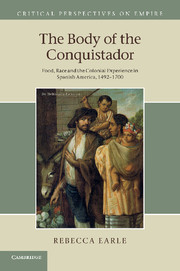Crossref Citations
This Book has been
cited by the following publications. This list is generated based on data provided by Crossref.
Guengerich, Sara Vicuña
2013.
Unfitting shoes: footwear fashions and social mobility in colonial Peru.
Journal of Spanish Cultural Studies,
Vol. 14,
Issue. 2,
p.
159.
Romaniello, Matthew P.
2013.
Who Should Smoke? Tobacco and the Humoral Body in Early Modern England.
The Social History of Alcohol and Drugs,
Vol. 27,
Issue. 2,
p.
156.
Shapin, Steven
2014.
‘You are what you eat’: historical changes in ideas about food and identity.
Historical Research,
Vol. 87,
Issue. 237,
p.
377.
Koslofsky, Craig
2014.
Knowing Skin in Early Modern Europe, c. 1450–1750.
History Compass,
Vol. 12,
Issue. 10,
p.
794.
Chastanet, Monique
Chouin, Gérard
Lima, Dora De
and
Guindeuil, Thomas
2014.
Pour une histoire de l’alimentation en Afrique avant le XXe siècle.
Afriques,
Chastanet, Monique
Chouin, Gérard
Lima, Dora De
and
Guindeuil, Thomas
2014.
Towards a history of foodways in Africa before the 20th century.
Afriques,
Tuncay, Vildan Bahar
2015.
El programa «Juntos»: en la intersección del multiculturalismo neoliberal y del indigenismo estatal peruano.
Cahiers des Amériques latines,
p.
57.
Aram, Bethany
2015.
Caribbean ginger and Atlantic trade, 1570–1648.
Journal of Global History,
Vol. 10,
Issue. 3,
p.
410.
Cagle, Hugh
2015.
Beyond the Senegal: inventing the tropics in the late Middle Ages.
Journal of Medieval Iberian Studies,
Vol. 7,
Issue. 2,
p.
197.
White, Sam
2015.
Unpuzzling American Climate: New World Experience and the Foundations of a New Science.
Isis,
Vol. 106,
Issue. 3,
p.
544.
Wells, Andrew
2015.
Racisms: from the Crusades to the twentieth century.
Intellectual History Review,
Vol. 25,
Issue. 2,
p.
247.
Brown, Matthew
2015.
The global history of Latin America.
Journal of Global History,
Vol. 10,
Issue. 3,
p.
365.
Wade, Peter
2015.
Race.
McCleery, Iona
2015.
What is “colonial” about
medieval
colonial medicine? Iberian health in global context
.
Journal of Medieval Iberian Studies,
Vol. 7,
Issue. 2,
p.
151.
2015.
Global Indios.
p.
289.
Freund, Heather
2016.
Who should be treated “with every degree of humanity”? Debating rights for planters, soldiers, and Caribs/Kalinago on St. Vincent, 1763–1773.
Atlantic Studies,
Vol. 13,
Issue. 1,
p.
125.
Fine-Dare, Kathleen S.
2016.
Hidden Histories of Indigeneity in Urban Andean Ecuador: Transubstantiation, Ceremony, and Intention in Quito.
Anthropological Forum,
Vol. 26,
Issue. 4,
p.
376.
Andrews, Norah
2016.
Calidad, Genealogy, and Disputed Free-colored Tributary Status in New Spain.
The Americas,
Vol. 73,
Issue. 2,
p.
139.
Alain, Hubert
2017.
CONTROL: the extractive ecology of corn monoculture.
Cultural Studies,
Vol. 31,
Issue. 2-3,
p.
232.
McClure, Julia
2017.
Earthrise.
The Medieval History Journal,
Vol. 20,
Issue. 1,
p.
89.





